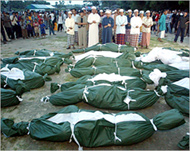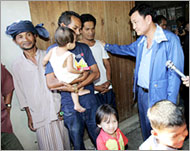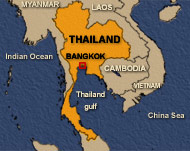Thailand drops Muslim protest cases
Thailand has dropped charges against 92 Muslims involved in a 2004 protest that led to 78 people dying in army custody.

according to the attorney-general’s office
The order came a day after Surayud Chulanont, the Thai prime minister, apologised for past government policies now blamed for stoking unrest in the south of the country, where more than 1,700 people have been killed in the past three years.
Patchara Utithamdamrong, the attorney-general, signed the order dropping charges of instigating public disorder and disobeying authorities against 92 people, who were freed on bail, .
Spokesman Attapol Yaisawang said on Friday: “The order was sent today to the provincial prosecutors office in Narathiwat and we expect the prosecutors to ask the court to withdraw the charges on Monday.”
Mass suffocation
On October 25, 2004, police and soldiers shot dead seven protesters as they dispersed a rally in front of the police station in the Narathiwat town of Tak Bai, near the Malaysian border.
Another 78 were crushed or suffocated to death after they were stacked “like logs”, in the words of one survivor, in the back of army trucks and transported to an army camp.
 |
|
In October 2004 police action left |
Attapol said among the 92 arrested in 2004, 58 had been put on trial but no verdicts had been reached.
Two suspects died during the court proceedings.
A government-appointed inquiry found the methods used to break-up the demonstration were inappropriate, but army officers in charge of the operation were not punished.
The general in charge of the south during the incident was later transferred to a less responsible post in Bangkok, where he was promoted under the government of Thaksin Shinawatra, the Thai prime minister who was ousted in a bloodless coup on September 19 this year.
Official apology
On Thursday, speaking to 1,000 Muslim leaders in the southern town of Pattani, the Thai prime minister pledged to investigate the disappearance of Muslims and to root out corrupt and abusive officials in the three southern provinces.
“I’m here today to apologise for what past and present governments have done,” Surayud said.
“I come here today to reach out to everyone and say: I am sorry.”
He admitted that, as a former army chief, he had failed to counter what he called the oppressive actions of Thaksin.
Thaksin’s role
In 2002, Thaksin dissolved a 21-year-old multi-agency body once credited with keeping stability in the majority-Muslim south, saying the low-key separatist movements of the 1970s and 1980s had come to an end and the violence was caused mainly by “petty thugs”.
After the Southern Border Provinces Administration Centre (SBPAC) was disbanded, unrest brewed and exploded in January 2004 when there were a number of arson attacks on schools across the region and raids on an army camp.
 |
|
Thaksin’s carrot-and-stick policy |
Thaksin sent thousands of troops and police to the region and, according to analysts, hundreds of suspects were abducted and tortured.
This week, the government revived the SBPAC, which focused on rural development and investigated complaints of corruption and injustice, and appointed a Buddhist southerner to head the agency.
However, General Sonthi Boonyaratglin, who led the September 19 coup that toppled Thaksin, said on Wednesday the SBPAC faced a difficult job to restore peace in a region where daily shootings and bomb attacks had not stopped since the coup.
Unrest background
Students of southern Thailand’s ethnic politics cite three major Muslim grievances: a failure of the federal authorities to acknowledge their history and culture; economic marginalisation of the region in a country with a successful tourist industry; and anger over such issues as Palestine and Iraq in the context of Bangkok’s close ties to Washington.
 |
|
Many southern inhabitants are |
Part of the problem is also rooted in the region’s history and culture.
The former sultanate of Pattani, which covered the three Muslim-majority Thai provinces, are seen by locals as the cradle of Islam in the region.
Many southern inhabitants are ethnic Malays who speak a dialect different from their northern Thai neighbours.
The area was annexed by mainly Buddhist Thailand in 1902 as a buffer against British-ruled Malaya.